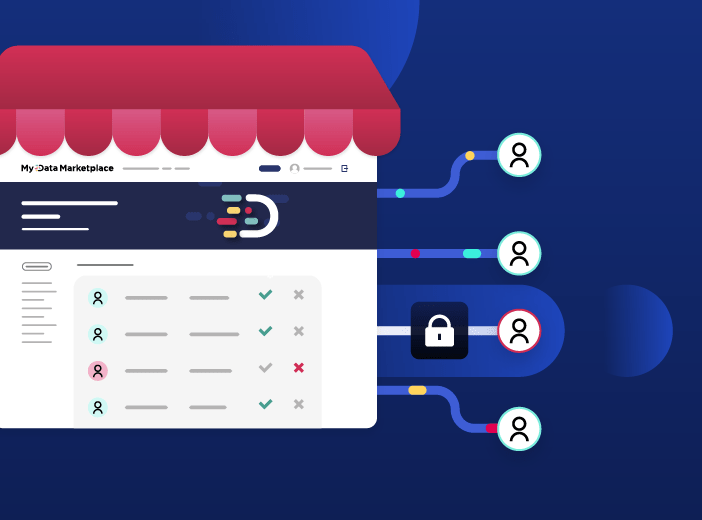Glossary
Data Management Platform (DMP)
A complete definition of Data Management Platforms (DMPs), their benefits, and their central role in modern data management.
Efficient data management has become imperative in today’s digital world for all organizations, whether private or public. Data plays, and will continue to play, a major role in effective operations, achieving competitiveness, and for regulatory compliance.
To work effectively with data, organizations need Data Management Platforms (DMPs). These solutions are crucial for collecting, storing, organizing, and strategically leveraging data within organizations. Discover their exact role in this article.
What is a Data Management Platform (DMP)?
A Data Management Platform, or DMP, is a comprehensive software solution that includes a range of tools and technologies to enable management of the complete data lifecycle within an organization. It serves as a central pivot, allowing businesses to effectively manage their informational resources from initial collection to advanced analysis, and even data sharing or selling.
To complement this definition, here is a list of some of the key data management tools found within a Data Management Platform:
- Data Lake: A storage space designed to hold massive volumes of raw data, often unstructured, from various sources. Notable players include Amazon S3, a cloud storage service.
- Data Warehouse: A centralized data storage space designed for in-depth data analysis and report generation. The Data Warehouse provides an optimized environment for handling complex queries, playing an essential role in consolidating data for meaningful analysis.
- Data Catalog: A structured list of data assets within the organization, using metadata to facilitate data management. This tool contributes to more effective governance and optimal use of data within the enterprise.
- Business Intelligence (BI) Tools: BI tools convert data into actionable insights (tables, charts, diagrams, maps, schemas, etc.) to facilitate decision-making. For example, Tableau’s provides offers data visualization and analysis capabilities.
Data Portal: The data portal represents the final step in the journey, serving as the interface that enables data to be accessed and interacted with by a wide range of audiences (employees, partners, clients, the general public) in an intuitive, transparent, and user-friendly manner. - Data Portal: The data portal represents the final step in the journey, serving as the interface that enables data to be accessed and interacted with by a wide range of audiences (employees, partners, clients, the general public) in an intuitive, transparent, and user-friendly manner.
One of the strengths of Data Management Platforms lies in their ability to promote interoperability among these different tools. Organizations normally need a combination of data lakes, data warehouses, data catalogs, BI tools, and data portals to meet their specific needs.
The Data Lifecycle in Data Management
Data management covers the entire data lifecycle, from creation to exploitation or sale. Below is a brief summary:
- Creation and Collection: Collecting data throughout the organization.
- Storage: Utilizing tools such as data lakes, data warehouses, or the Cloud.
- Maintenance: Maintaining data availability for use.
- Confidentiality and Security: Processes for data confidentiality, security, and backup.
- Compliance: Adhering to regulations, including around retaining, and protecting customer information.
- Integration and Transformation: Integrating, processing, enriching, and transforming data.
- Sharing: Internally and externally sharing data through data portals.
- Performance management: Monitoring performance and continuously improving data management processes through the implementation of master data management.
Data Management Platform FAQs
Who are Data Management Platforms designed for?
Data Management Platforms are designed to meet the needs of businesses of all sizes, whether small, medium, or large. These platforms offer flexible and tailored solutions, regardless of the volume of data to be managed.
What are the benefits of a data management approach combining multiple tools?
The planned integration of different data management tools provides organizations with the opportunity to create a comprehensive data ecosystem. By combining the use of data lakes, data warehouses, data catalogs, and BI tools, a holistic approach to the data lifecycle emerges, optimizing each stage from collection to analysis. This approach promotes data centralization, enables consistent analysis across diverse datasets, improves decision-making at all levels by facilitating better, faster data access, enhances operational efficiency by optimizing internal processes, creates potential new revenue sources, and encourages data democratization by giving a wide range of users access through data portals.
How do Data Management Platforms promote data democratization?
Data Management Platforms integrate user-friendly portals that simplify access to data. These portals make data understandable for a broad audience, thus promoting data democratization. By allowing various users to explore, understand, and use data autonomously, these platforms encourage collaboration and innovation within the organization.
Learn more

Why data contracts and data product marketplaces are essential to increasing data value
Data contracts are key to building trust in data in distributed environments, and are at the heart of data products. We look at how to build and enforce data contracts through a data product marketplace to unlock greater value from data.

Everything you need to know on data products for business users
It can be hard to understand exactly what a data product is, given the many ways that the term is defined and applied. To provide clarity this article provides a business-focused definition of a data product, centered on how it makes data accessible and usable by the wider organization, while creating long-term business value.

